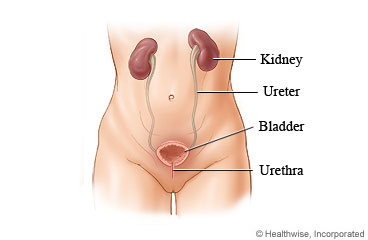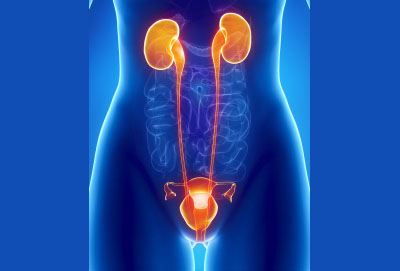The urinary tract makes and stores urine and removes it from the body. Parts of the urinary tract include:
- Kidneys — collect waste from blood to make urine
- Ureters — carry the urine from the kidneys to the bladder
- Bladder — stores urine until it is full
- Urethra — a short tube that carries urine from the bladder out of your body when you pass urine
Any part of this system can become infected.

The culprit in most uncomplicated infections is a type of bacteria called Escherichia coli, better know as E. coli which normally lives in the bowel (colon) and around the anus. There are multiple ways by which a UTI can come about. Some of them include:
- Wiping from back to front after a bowel movement . Bacteria can get into your urethra, which has its opening in front of the vagina.
- During sexual intercourse, bacteria in the vagina can be pushed into the urethra.
- Waiting too long to pass urine. When urine stays in the bladder for a long time, it gives the bacteria more time to multiply. .
- Using a diaphragm or spermicide for birth control, or spermicides. These can both cause local irritation and lead to infection.
- Anything that makes it hard to completely empty your bladder, like a kidney stone.
- Having diabetes, reduces your immunity i.e makes it harder for your body to fight other health problems.
- Having had a catheter in place. A catheter is a thin tube put through the urethra into the bladder. Usually in hospitalized patients or people who can’t pass urine on their own.
Pregnant women are at increased risk for an UTI. Typically, If a woman is pregnant, her urine should be checked during prenatal visits because an unrecognized infection can cause pregnancy complications.
As a rule, the farther up in the urinary tract the infection is located, the more serious it is.
The upper urinary tract is composed of the kidneys and ureters. Infection in the upper urinary tract generally affects the kidneys (pyelonephritis), which can cause:
- Fairly high fever (higher than 101 F)
- Shaking chills
- Nausea
- Vomiting
- Flank pain: pain in the back or side, usually on only one side at about waist level
The lower urinary tract consists of the bladder and the urethra. Infection in the lower urinary tract can affect the urethra (urethritis) or the bladder (cystitis).
- Dysuria: which is pain or burning during urination
- Frequency: more frequent urination (or waking up at night to urinate, sometimes referred to as nocturia); often with only a small amount of urine
- Urinary urgency: the sensation of having to urinate urgently
- Cloudy, bad-smelling, or bloody urine
- Lower abdominal pain or pelvic pressure
- Mild fever (less than 101 F), chills, and a general feeling of unwellness

The single most important lab test is urinalysis. A simple dipstick test of the urine which can be done in the doctors office (or even at home) can show signs of infection, such as the presence of white blood cells and bacteria.
In some cases urine microscopy, culture and sensitivity may also be done to find out the exact species of bacteria causing the infection and the particular antibiotics it may be susceptible to.
Treatment of UTIs is usually a 3-7 day course of antibiotics to kill the offending bacteria. Duration of treatment and antibiotics used may vary depending on the severity of symptoms.
As with all medical conditions, prevention is always better than cure. You can prevent getting a UTI by noting the following tips:
- Empty your bladder frequently as soon as you feel the need to go; don’t rush, and be sure you’ve emptied your bladder completely.
- Always wipe from front to back.
- Drink lots of water.
- Choose showers over baths.
- Stay away from feminine hygiene sprays, scented douches, and scented bath products — they’ll only increase irritation.
- Wash your genital area before sex.
- Urinate after sex to flush away any bacteria that may have entered your urethra.
- Avoid using diaphragms, unlubricated condoms, or spermicidal jelly for birth control, consider switching to another method. Diaphragms can increase bacteria growth, while unlubricated condoms and spermicides can cause irritation. All can make UTI symptoms more likely.
- Keep your genital area dry by wearing cotton underwear and loose-fitting clothes. Avoid tight jeans and nylon underwear — these can trap moisture, thereby creating the perfect environment for bacteria growth.
- Drinking lots of cranberry juice also helps to flush bacteria from your system.
As always, it is important to see your doctor about any symptoms you may be having as some other disease conditions may share similar symptoms and the difference can only be made by proper diagnostic tests.







